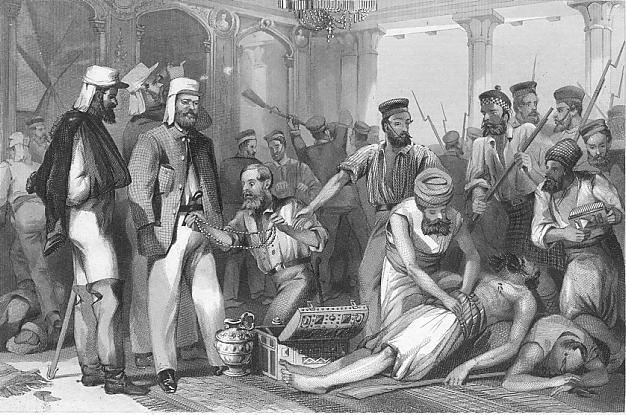Assault
Nicholson
was quick to show his impatience to lead an assault on the city defences. The fact that the city was huge and that the mutineers vastly outnumbered the British did not deter him. He was concerned that General Wilson was overly cautious and even suggested that he replace him. However, Wilson bowed to his suggested assault and preparations continued apace.By September 12th heavy guns were pounding the northern walls and bastions of the city. After three days of bombardment, Nicholson led the column which entered through a breach in the Kashmir Gate bastion. Meanwhile, the massive Kashmir Gae had been blown in by the Royal Engineers - most of whom were shot dead whilst attempting to place the charge. Colonel Campbell with the 52nd Foot led a column through the gate. The size of the city quickly overwhelmed the attackers as they realised that they may well have bitten off more than they could chew. Street fighting tied down the attackers as they became separated and isolated from one another. Nicholson himself was shot in the back as he advanced down narrow streets at the head of a force to try and open the Lahore Gate. He was carried to safety but would die soon after - although not before hearing the news that he had wanted to hear. The British forces had persevered against the disillusioned and disparate mutineer forces. The city had been carried - looting had been prohibited, but prize merchants were hard at work - much of the wealth of the city had already been claimed by mutineers, but significant amounts of plunder were recovered to make most of the attackers fairly wealthy. |

British soldiers looting Qaisar Bagh, Lucknow, after its recapture (steel engraving, late 1850s)
| British soldiers looting Qaisar Bagh, Lucknow, after its recapture (steel engraving, late 1850's). The steel engraving depicts the Time correspondent looking on at the sacking of the Kaiser Bagh, after the capture of Lucknow on March 15, 1858. "Is this string of little white stones (pearls) worth anything, Gentlemen?" asks the plunderer. | |
| Date | late 1850s |
Delhi had been taken but at the cost of Nikalseyn. It had been his decisiveness and drive that had led to the assault and he had maintained the drive when the assault wavered. At his funeral, his Multani Horse sowars openly 'sobbed and wept as if their very hearts were breaking... For him they had left their Frontier homes, for him they had left their beloved hills to come down to the detested plains.' |
No comments:
Post a Comment